Connect Your Flow Sensor to Any Data Logger Buy Now
Pulse to Voltage Translator (Rev B)

Pulse to Voltage Translator Features
- Allows you to connect any flow sensor to a data logger.
- Linearly translates pulses to a voltage range of 0 to 3V.
- Easily integrates with our VegeHub WiFi Sensor Hub.
- Low cost.
- Low power.
- Is easy to trouble shoot systems with an LED that flashes with each input pulse.
- Can be configured for 4 different pulse ranges for maximum resolution.
- Optionally can be paired with a rugged and easy to mount case. (Sold separately.)
- Reads pulse rates up to 1000Hz.
Pulse to Voltage Translator Applications
- Crop Steering.
- Interface flow sensors, and wind sensors to low cost data loggers.
- Interface pulse output tachometers to any data logger.
- Detect expensive water system leaks and get alerts.
- Monitor water flow via WiFi.
- Get real time data on water costs.
- Greenhouse Automation.
Pulse to Voltage Translator Details
Our pulse to voltage translator allows you to easily connect flow sensors, and wind sensors to any data logger. This saves you money, because you can use low cost loggers, that don't have pulse inputs.
The translator has an internal pull up resistor on its input line, and will accept pulses from all sensors that have pulsed open drain/collector outputs.
We've made it easy to verify your flow sensor is working. The LED pulses whenever it receives 20 input pulses for quick visible verification.
Optimized for Linearity and Resolution
The translator will convert pulse rates from 0 to 1000Hz linearly to a voltage range of 0 to 3V. There are 4 pulse frequency ranges that can be selected with an internal jumper:
- 0 to 125Hz.
- 0 to 250Hz.
- 0 to 500Hz.
- 0 to 1000Hz.
Vegetronix Modular Building Blocks
We take a modular approach with our product lines. Each product is simple and low cost, and will easily interface to all of our other products. This approach allows you to build any type of application from our basic set of components.
Get Emails and Text Alerts
When used with our WiFi Sensor Hub you can get email or text notifications of leaks, or unexpected water usage as indicated by your flow sensors.
Two Optional Easy to Mount Enclosure Options
To keep the cost low, we sell the board by itself, or you can optionally pair it with an enclosure. We have two case styles: a simple low cost enclosure which is adequate for in door usage, and an robust weatherproof enclosure, if you intend on using the pulse translator outside. The enclosures are made of 3D printed PETG.
The simple case exposes the two terminal blocks, and also has a 3 pin keyed hole for use with our Vegetronix flow Sensors. It includes a lense allowing you to see the internal LED. The bottom part has flanges with mounting holes, making it easy to mount.
You can purchase the simple case from us for minimal cost, or 3D print your own enclosure, by downloading the VG-PULSE-TRANS-CASE STL files and printing the case yourself.
The weatherproof enclosure has a transparent lense allowing you to see the internal LED. The cable entries have sealing grommets and the base is bolted against a silicone rubber gasket. for rain and weather resistance. It has too sunken mounting brackets in the back. You can mount it to a PVC bracket or to a wall by inserting the slots over screw heads.
Need a 4-20mA Current Loop Output?
Drawing under 1mA it can easily be paired with our current loop translator, which transforms any voltage output device into a current loop output device. Because it draws under 4 mA, it can be loop powered. If your flow rate sensor brings the total current draw above 4mA you can still use the current loop translator, but you will need to power it from an external source, rather than the current loop.
We Want you to be Happy
Ordering is easy and low risk. Since we build our own products at our factory, all of our products are in stock. When you place your order from our website, it will ship same day from our factory, and you'll have it in your hands in just a couple of days. We ship to nearly EVERY COUNTRY in the world.
If you aren't amazed and delighted by your new Pulse to Voltage Translator, return it for a refund within 30 days.
What Our Customers Are Saying:
"Your pulse to voltage translators work very well! We tried several models in the past but this is the only one which really works. We are happy with your device and we'll order in a short time a new batch."
Silvano - Vienna, Austria
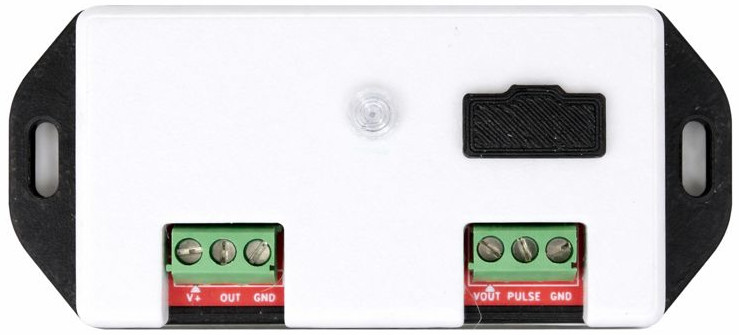
Pulse to Voltage Translator with Simple Case. (Case is sold separately)
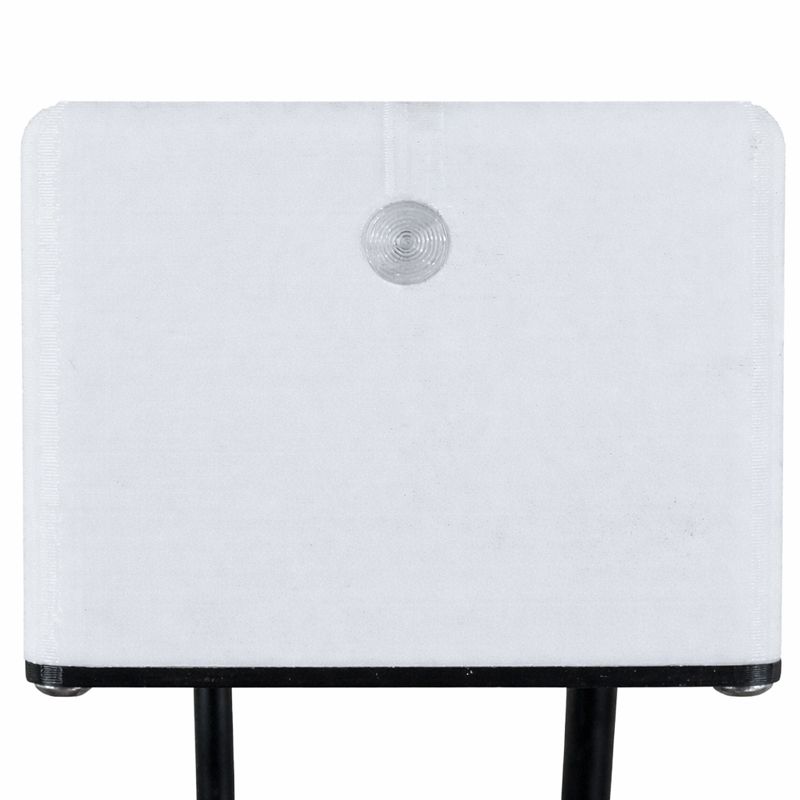
Pulse to Voltage Translator with Weatherproof Case. (Case is sold separately)
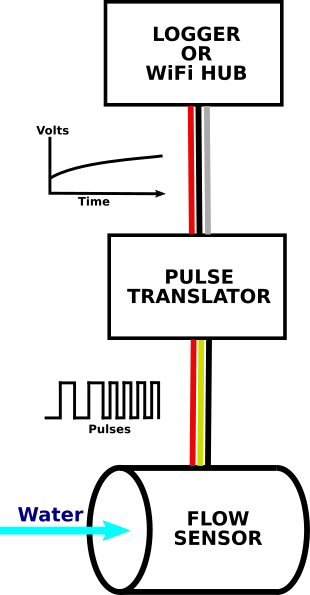
Pulse to Voltage Translator Functional Diagram.
VG-PULSE-TRANS - Pulse to Voltage Translator Ordering Info
We ship to nearly EVERY COUNTRY on the planet, directly to you from our factory.
99% of orders ship same day.
| BUY NOW FROM OUR WEBSITE STORE | |||
| Part Number | Description | Price | Purchase |
| VG-PULSE-TRANS | Pulse to Voltage Translator Board | Buy Now | |
| VG-PULSE-TRANS-CASE | Simple Plastic Enclosure for the Pulse to Voltage Translator Board | Buy Now | |
| VG-PULSE-TRANS-CASE-WP | Weatherproof Plastic Enclosure for the Pulse to Voltage Translator Board | Buy Now | |
Contact us for volume pricing information.
Other Vegetronix Products of Interest
Pulse to Voltage Translator - Specifications
| Input Voltage | 3.5VDC to 24VDC |
| Maximum Power | 3 mW |
| Current Consumption at 6V | 0.9 mA |
| Board Dimensions | 25.4mm x 31.75mm (1" x 1.25") |
| Enclosure Dimensions | See drawing below. |
| Operational temperature | -40°C to 85°C |
| Maximum Input Pulse Range | 1000Hz |
| Output Range | 0 to 3V |
| Output Resistance | 10K Ohms |
| Input Pull-up Resistance | 10K Ohms |
| Enclosure Material | Environmentally friendly PLA. |
Pulse to Voltage Translator Dimensions
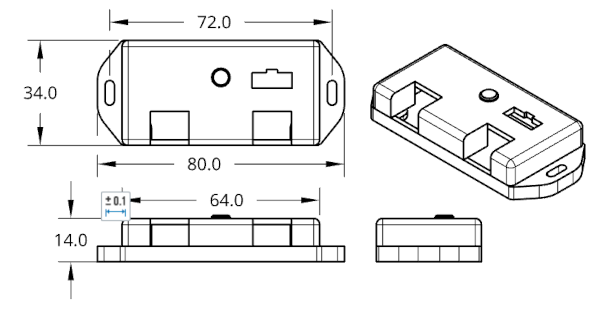
Simple Case Dimensions
Wiring Tables
WARNING! Do not reverse the order of the wires on the flow sensor, if you do it will likely destroy the flow sensor.
| Terminal Block: TB1 (VOLT OUT) | ||
|---|---|---|
| Pin Number | Label | Description |
| 1 (Square Solder Pad) | V+ | Power In. Connect to the logger's output power line. Receives power from the logger or battery. |
| 2 | VOUT | Voltage Output. Connect to logger input. |
| 3 | GND | Ground. Connect to ground of logger, or negative voltage of battery. |
| Terminal Block: TB2 (PULSE INPUT) | ||
|---|---|---|
| Pin Number | Label | Description |
| 1 (Square Solder Pad) | GND | Ground. Connect to ground (black wire) of flow sensor |
| 2 | PULSE | Pulse In. Connect to pulse output (yellow wire) of flow sensor. |
| 3 | V+ | Power Out. Connect to the power input (red wire) of flow sensor. |
Pulse to Voltage Translator - Configuring the Frequency Range Jumper
To configure the translator you will need to figure out the maximum pulse rate of your flow sensor in Hz. Set the range jumper to the closest setting that is higher than this value. The sensor's data sheet should tell you the maximum pulse rate.
In the case of flow sensors, most sensors have specify the pulse rate as a factor of flow in
the following form:
freq(hz)= K*Q + B.
where Q is the flow rate, normally in liters/min,
and K is a scaling factor, and B is an offset.
For example if your sensor has a maximum flow rate of 30 liters/min, and a scaling factor of 11. Then your maximum pulse rate would be 330Hz (30*11), and you would use the range setting specified by 500Hz, as this is the next highest value above 330Hz.
Pulse to Voltage Translator - How to Figure out the Transform Equation for Vegecloud for Flow Sensors.
If you are connecting your flow sensors to a VegeHub wifi logger and sending the data to Vegecloud. You'll need to specify a transform to convert the voltage from the pulse translator to units of flow, such as liters/second. We'll take you through the math, so you know how to do it yourself, and then provide a table for some of the flow sensors that we carry.
Flow sensor indicate the flow rate in Liters/second by generating pulses. The faster the flow, the faster the pulse rate in Hz. The form of the Frequency to flow equation is Q= aF+b, where Q is flow rate, F is frequency, and b is an offset. Each flow sensor has a different equation.
The pulse trans converts pulses to a voltage. It has an equation of the form: F= Rmax*Vp/3V, where Rmax is the max frequency of the particular frequency range you've selected with the range jumper, and Vp is the voltage out of the pulse translator. The 3V is due to the fact that the maximum voltage out is 3V.
So we need to combine these two equations into a single equation that we can enter into vegecloud so it can convert the voltage that is reported by the hub back to a transform equation, that will give us a result as a flow rate as a function of Voltage Vp.
We substitute the equation: Rmax*Vp/3V into the equation Q= aF+b, and get:
Q= a*Rmax*Vp/3V + b
Now so that you don't need to go through the math yourself, we've created a table of vegecloud transforms for each of the flow sensors that we carry.
| Flow Sensor Equations. Assumes 0 to 125Hz Range Jumper. Vp is the Output Voltage From the VG-PULSE-TRANS | ||||
|---|---|---|---|---|
| Flow Sensor | Flow Equation(L/min) | Flow Equation(G/min) | Vegecloud Transform Equation (L/min) | Vegecloud Transform Equation (Gallons/min) |
| VG-FLOW-0_5 | Q= F/11 | Q= F/41.6 | Q= 3.78*Vp | Q= 1.00*Vp |
| VG-FLOW-0_75 | Q= F/6.6 | Q= F/25 | Q= 6.31*Vp | Q= 1.666*Vp |
| VG-FLOW-1_0 | Q= 0.166*F + 1.333 | Q= 0.044*F + 0.352 | Q= 6.944*Vp + 1.333 | Q= 1.833*Vp + 0.352 |
Wiring Diagram - Flow Sensor to VegeHub
WARNING! Do not reverse the order of the wires on the flow sensor, if you do it will likely destroy the flow sensor.
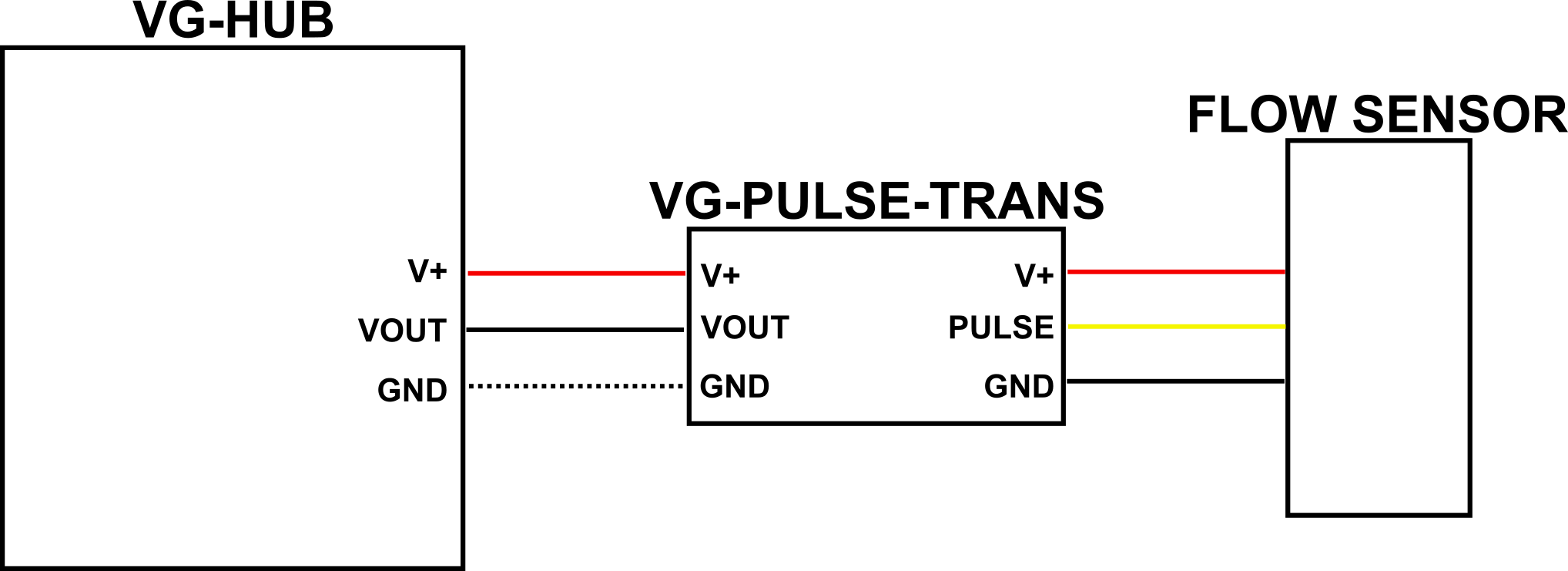
The VG-PULSE-TRANS can be used to connect a flow sensor to a VegeHub WiFi Sensor Hub